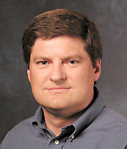Gerald Keeler
Gerald Keeler, professor of environmental health sciences and of atmospheric, oceanic and space sciences, died April 12 after a long battle with cancer. He was 51.
An environmental researcher and teacher who had global impact, Keeler’s work focused on the sources and fate of trace elements and other pollutants and their impacts on human health and the environment, and the development of new measurement and analytical tools. He was a leading expert on air pollution and mercury issues, working with a range of state, federal and international agencies.

A native of Burnt Hills, N.Y., Keeler attended Boston College, where he played collegiate basketball, receiving his Bachelor of Science degree in physics in 1982. He continued his studies at U-M, receiving his Master of Science degree in 1983 and his doctorate in 1987, both in atmospheric sciences. He returned to Boston in 1987 as a research associate at the Harvard School of Public Health, during which time he also served as visiting scientist at the MIT Nuclear Reactor Laboratory in Cambridge.
In 1990 Keeler returned to U-M as an assistant professor in the Department of Environmental Health Sciences, School of Public Health (SPH), and as director of the U-M Air Quality Laboratory. An enthusiastic teacher and rigorous scientist, he took on a variety of responsibilities. From 1990-2000, he served as director of the EPA Air Pollution Training Center at U-M, overlapping with another position he held as a research scientist with the Center for Great Lakes and Aquatic Sciences. At U-M he became associate professor in SPH and the College of Engineering (CoE) in 1996, and was promoted to professor in 2003, with appointments in SPH, CoE and Department of Geological Sciences in LSA.
“Jerry personified scholarship and interdisciplinarity at the University of Michigan,” says his colleague Martin Philbert, dean of SPH. “He was passionate about his teaching, his students and his research. As a collaborator, he was exceptional and his work stands as a testament to Jerry’s dedication to the proposition of excellence in science in the service of public health.”
During his 20-year career as a faculty member, Keeler mentored and served as principal adviser to more than 40 master’s and doctoral students.
Keeler’s research was global. He went to the Arctic to study mercury, to the Florida Everglades to study the ecosystem and to Lake Michigan to study the travel patterns of airborne particulates. He was a member of the Michigan Mercury Electric Utility Workgroup, the Michigan Governor’s Relative Risk Task Force on Air Quality, the Environmental Advisory Council of the Michigan DEQ, and the Michigan Environmental Science Board. He also provided expertise to the states of Florida, Illinois, Massachusetts, Tennessee, Virginia, Vermont and Wisconsin. Not long before his death, he contributed to a report by the United Nations Environment Program’s global partnership on atmospheric mercury transport and fate research.
“Jerry was an extremely important voice in the national debate over mercury in the environment,” says Perry Samson, Arthur F. Thurnau Professor of Atmospheric Science and associate chair of the Department of Atmospheric, Oceanic and Space Sciences. “The United States EPA has proposed the first national standard for emissions of mercury from coal-burning power plants. Few would deny that this is a part of Jerry’s legacy. His work has done so much to identify sources of mercury in the atmosphere, and helped to lead to pollution controls that will improve health for many people. His work will live on, in part because of the high quality of the work itself and in part because of the quality of the students he has prepared.”
Keeler published more than 100 papers in peer-review journals while teaching a variety of graduate and undergraduate environmental, atmospheric and climate change courses. He was an adviser to a variety of national and international organizations, programs and journals. He received numerous awards, including the Research Partnership Award from the Rackham School of Graduate Studies, and the Excellence in Research Award and Alumni Merit Award from CoE. He served on numerous national committees and was a member of the American Chemical Society, the American Meteorological Society, the International Society of Exposure Analysis, the American Geophysical Union and the American Association for Aerosol Research.
Keeler is survived by his wife of 27 years, Joanne, and his children Ryan, Kevin and Meghan. A memorial service was held April 17. Contributions in his memory may be made to Arbor Hospice.
— Submitted by Terri Weinstein Mellow, School of Public Health

